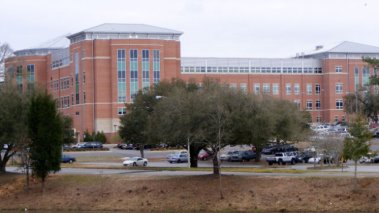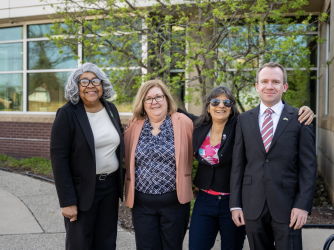Table of Contents
Federal Judge Issues Mixed Ruling in U. of South Alabama Free Speech and Due Process Case

Last August, I reported on a University of South Alabama (USA) student group’s federal lawsuit alleging that the university violated the group’s members’ First Amendment right to free expression by confining them to a tiny “speech zone” on campus, and that its overbroad and vague policies violate students’ due process and equal protection rights. Earlier this month, Chief District Judge William H. Steele ruled on USA’s motion to dismiss the case, dismissing some claims and allowing other claims to survive.
The case arose after USA administrators repeatedly denied Students for Life USA’s requests to set up a “Cemetery of the Innocents” display in an outdoor area of campus that the group’s members believed would best reach their target audience. Administrators told the group that because it “advocates for a position that involves political and social controversy,” it was allowed to speak only in the designated speech zone. USA subsequently revised its solicitation policy to make it less restrictive, but even this policy provides ample opportunity for administrators to silence or punish controversial or unpopular speech.
Students for Life USA founder Katherine Sweet took to AL.com just before the ruling to share her deep disappointment in the university’s implementation of a “speech zone” and its denial of the group’s requests. She wrote:
As a college student, I can't think of a part of the First Amendment that's more significant than our freedom to speak—to be sure, speaking, discussing, debating, and engaging is at the core of education, and a reason that many enroll at a higher education institution at all. Thus, last spring, our attorneys at Alliance Defending Freedom filed a lawsuit on our behalf, fighting for our vital right to speak on our campus.
As a student at University of South Alabama, I have found this experience both eye-opening and greatly disappointing. I went to South thinking it would be a place where I could debate freely with other students, engage in discourse, and ultimately learn from not only our professors, but each other. Aren't universities supposed to be atmospheres that promote just that?
FIRE certainly thinks so.
Judge Steele took a cramped approach to freedom of speech at the public university, rejecting Students for Life’s argument that outdoor areas of the campus were traditional or designated public forums. While this conflicts with other cases (notably Roberts v. Haragan, a FIRE case at Texas Tech University), it still does not mean that governmental actors like USA administrators can lawfully carry out viewpoint-based censorship, as they did in this case. Judge Steele writes:
"[E]ven in a non-public forum, the law is clearly established that the state cannot engage in viewpoint discrimination—that is, the government cannot discriminate in access to the forum on the basis of the government's opposition to the speaker's viewpoint." Cook v. Gwinnett County School District, 414 F.3d 1313, 1321 (11th Cir. 2005). The plaintiff argues that [Assistant Vice President for Student Affairs Michael] Mitchell and [Dean of the College of Engineering John] Steadman engaged in content discrimination and viewpoint discrimination when, while the First Policy was in force, they denied the plaintiff permission to place a cemetery of innocents in the Perimeter. The plaintiff has evidence that permission was denied because the plaintiff "advocates for a position that involves political and social controversy." The Court agrees with the plaintiff that this e-mail constitutes evidence that Mitchell and Steadman denied permission due to the plaintiff's viewpoint ("position") on abortion (pro-life).
[Citations omitted.]
The survival of the students’ viewpoint-based First Amendment claim is important in light of how often college administrators across the country attempt to silence the expression of certain viewpoints, regardless of how clearly such expression is constitutionally protected.
The court rejected Students for Life’s argument that the administrators should be held responsible in their individual capacities for violating the group’s due process and equal protection rights by enforcing the first policy against it. The case will, however, continue on the question of whether the second policy unconstitutionally infringes on students’ free speech, due process, and equal protection rights.
FIRE will write back with more updates on the case, Students for Life USA v. Waldrop, as it progresses.
Recent Articles
FIRE’s award-winning Newsdesk covers the free speech news you need to stay informed.

VICTORY: Michigan town declares Sept. 6 ‘First Amendment Day’ after FIRE sues its mayor for shouting down residents

USC canceling valedictorian’s commencement speech looks like calculated censorship

Back into the FIRE: Hasen’s response to FIRE and Rohde: Don’t read the press clause out of the Constitution — First Amendment News 420
